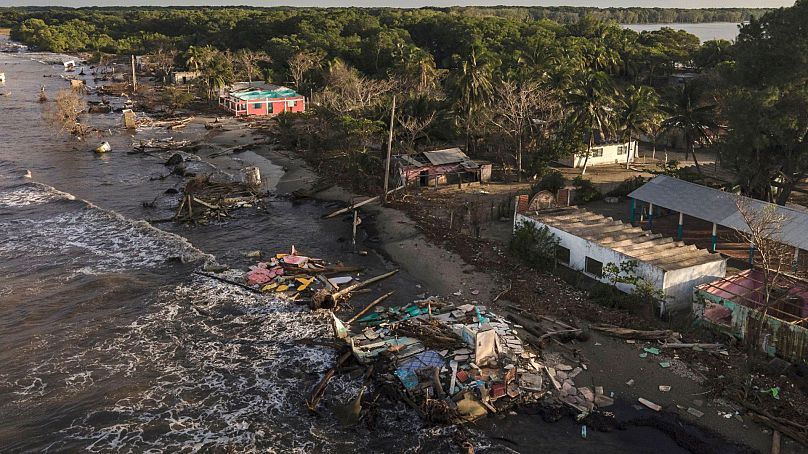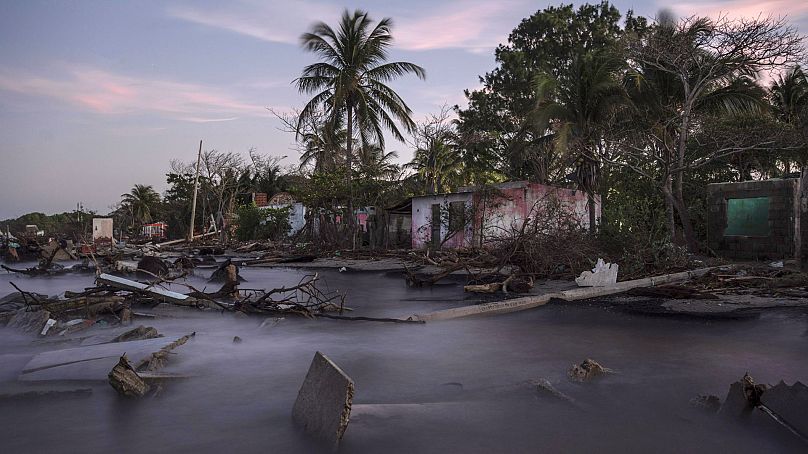In the shadow of Mexico’s oil industry, a fishing community has been lost to the rising seas.
“I would go to sleep listening to the sea’s noise. I would tell him [the sea] I know I’m going to miss you because with that noise you taught me how to love you.”
 ADVERTISEMENT
ADVERTISEMENT
 ADVERTISEMENT
ADVERTISEMENT
When the flood came for Eglisa Arias Arias’ house, she asked the sea for enough time to collect her things, and it gave her that.
“And so, when I left there, I said goodbye to the sea. I gave him thanks for the time he was there for me.”
Arias had to flee her home in the beachside town of El Bosque in early November. She was one of many who moved to the Gulf of Mexico in the 1980s in search of work, mostly in fishing.
Now less than a dozen residents are left as the ocean swallows up El Bosque due to brutal winter storms and some of the world's fastest rising sea levels.
By 2050 millions more Mexicans will be displaced by climate change, according to the Mayors Migration Council, a coalition researching internal migration.
Just one storm away from obliteration
El Bosque is a mass of twisted piles of concrete where houses used to be. Forced to flee the homes they built, locals have moved to rental properties, desperately awaiting government aid.
Guadalupe Cobos is one of the few still living in town. Residents’ relationship with the sea is “like a toxic marriage,” Cobos says, watching the waves.
“I love you when I’m happy, right? And when I’m angry I take away everything that I gave you,” she said.
Along with rapidly rising water levels, winter storms called "nortes” have moved the shoreline by more than 500m since 2005, according to Lilia Gama, coastal vulnerability researcher at Tabasco Juarez State University.
“Before, if a norte came in, it lasted one or two days,” said Gama. “The tide would come in, it would go up a little bit and it would go away.”
Now, fueled by warming air which can hold more moisture, winter storms stay for several days at a time.
Local scientists say one more powerful storm could destroy El Bosque for good. Relocation, slowed by bureaucracy and a lack of funding, is still months away.
Mexico shoots itself in the foot with its oil industry
As the sun sets over the beach, Cobos, known as Doña Lupe to neighbours, points to a dozen small, orange stars on the horizon - oil platforms burning gas.
“There is money here,” she says, “but not for us.”
As El Bosque was settled, state oil company Pemex went on an exploration spree in the Gulf - tripling crude oil production and making Mexico into a major international exporter. The country has a new refinery planned in Tabasco, just 50 miles (80 kilometres) west of El Bosque.
Gulf of Mexico sea levels are already rising three times faster than the global average, according to a study co-authored by researchers from the UK, New Orleans, Florida and California this March.
Mexicans are being left behind
Coastal communities around the world facing similar slow-motion battles with the water, from Quebec to New Zealand, have begun beating a “managed retreat.”
Very little, however, seems managed about the retreat from El Bosque. When the Xolo family fled their home in late November they left in the middle of the night, all 10 children under a tarpaulin in pouring rain.
When the Associated Press visited El Bosque during a storm at the end of November, the community was accessible only on foot or motorbike.
New houses will not be ready before fall 2024, says Raúl García, head of Tabasco’s urban development department, who himself said the process is too slow.
While advocates call for specific climate adaptation laws, President Andrés Manuel Lopéz Obrador, born just inland, has made oil development a key part of his platform.
That might change if former Mexico City Mayor and accomplished scientist Claudia Sheinbaum is elected president next year. Despite being Lopéz Obrador’s protégée, she pledges to commit Mexico to sustainability, a promise more urgent than ever.












